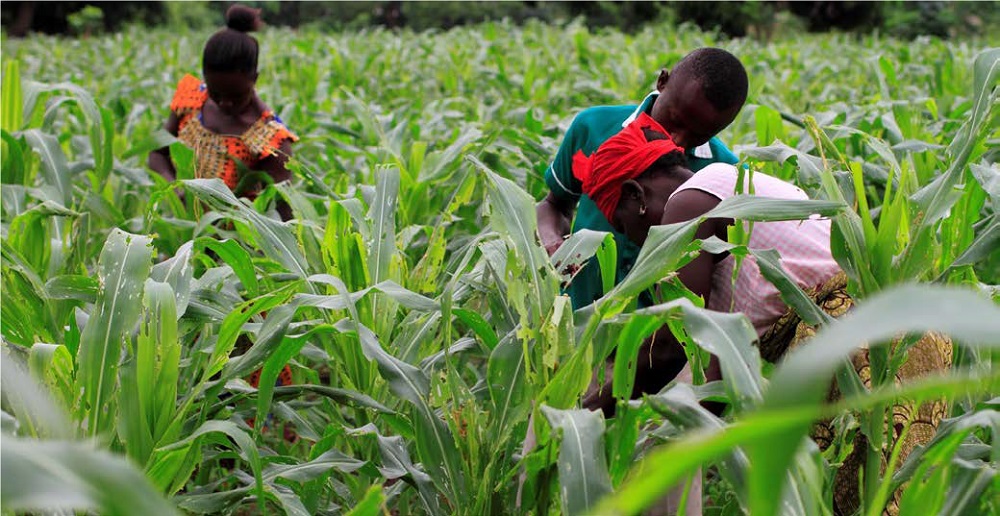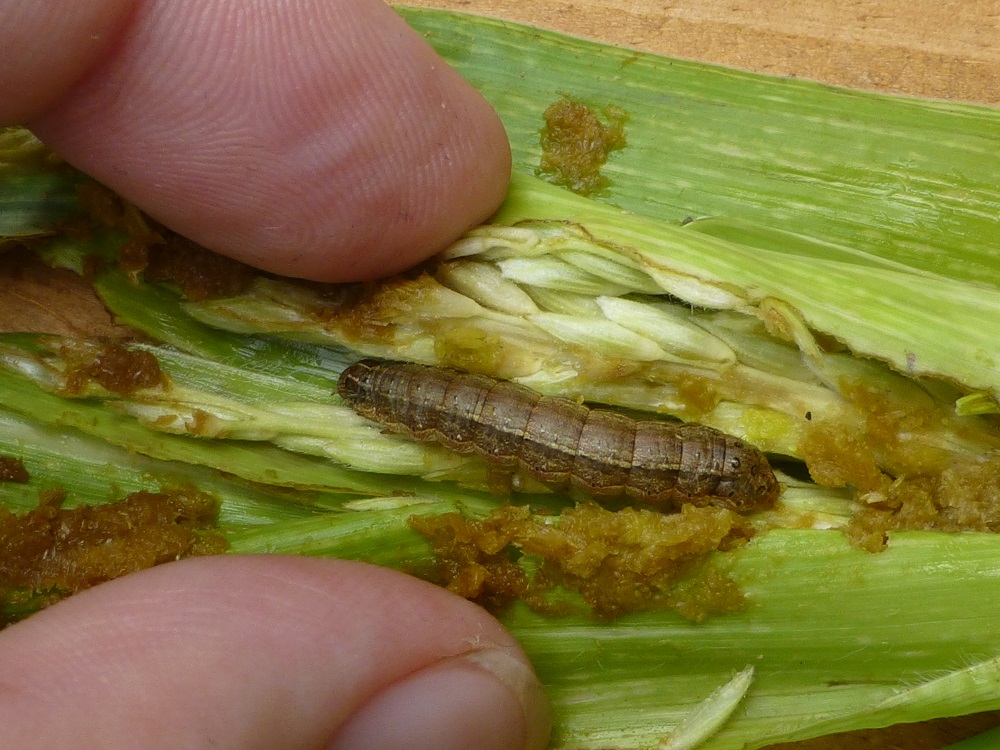
A team of CABI and Plant Protection and Regulatory Services Directorate (PPRSD) scientists have shared their expertise on invasive species and development communications and extension to publish a new CABI Study Brief looking at the outcomes and lessons learnt from the implementation of a fall armyworm management plan in Ghana.
The invasive fall armyworm (Spodoptera frugiperda) was confirmed present in Ghana in 2016 and in 2018 reports suggest that the pest had caused losses of around US$177 million to the country’s annual maize crop – significantly impacting upon the livelihoods of smallholder farmers.
In response to the fall armyworm outbreak, CABI – through the Action on Invasives programme – launched a range of activities in Ghana in 2017 which included supporting the development of a national fall armyworm management plan together with the PPRSD of the Ministry of Food and Agriculture (MOFA), and other stakeholders.
The CABI Study Brief, ‘Implementation of fall armyworm management plan in Ghana: outcomes and lessons’, outlines how stakeholder collaboration at various levels led to increased public awareness of fall armyworm and management practices, research into low-risk management options, and contribution to policy and practice on how threats from invasive species could be managed more effectively in future.
CABI’s contribution included undertaking studies that provided evidence on the distribution and impact of fall armyworm in Africa, reviewing current research and development of control methods as well as a series of recommendations for the sustainable management of the crop pest.

Dr Monica Kansiime, one of the authors of the study brief, said, “Overall, the review of the implementation of the national fall armyworm management plan pointed to positive outcomes, and to specific areas of the plan that were successfully executed.
“In particular, successes were recorded in quickly reaching a wide audience of farmers and extension workers with knowledge on fall armyworm identification and management options; fall armyworm surveillance that covered the whole country, and collaborative research on best practice solutions including exploration for natural enemies, and evaluation of low risk fall armyworm control measures.”
The scientists add that the research results also helped shape policy and practice on the control of the fall armyworm with the Ghana Government choosing to promote biorationals. Furthermore, multi-stakeholder engagements also contributed to shaping the invasives policy that culminated in the development of a National Invasive Species Strategy and Action Plan (NISSAP).
Ebenezer Aboagye, Head, Crop Pests and Diseases Management Division at PPRSD, said, “The extensive sensitization and education of technical staff, farmers and the general public on early detection of the signs and symptoms of fall armyworm and early management was very effective in minimising the impact of the pest. The Plant Health Clinic sessions provided another opportunity for building smallholder farmer capacity for managing FAW in a sustainable manner.
“The three-tier monitoring (national, regional and district teams) approach adopted also provided regular feedback on fall armyworm situation that enabled quick review of management strategies such as the shift from the use of synthetic insecticides to biorational insecticides (botanicals and microbial pesticides) and biological control agents.”
Mr Aboagye added that the strengthening of the Fall Armyworm Monitoring and Early Warning System (FAMEWS) generate detailed and dependable knowledge on migration patterns of fall armyworm in the context of agro-ecologies and cropping systems. He said this approach can serve as a model for managing future incursion by invasive pests.
Read the full study brief for more detail on the outcomes and lessons learnt.
Additional information
Main photo: Farmers scouting for fall armyworm in Ghana (Photo: CABI).
Full paper reference
Kansiime, M.K., Beseh, P, Hevi, W., Lamontagne-Godwin, J., Clottey, V.A., Rwomushana, I., Day, R., Rware, H., Aboagye, E. and Williams F. (2020). Implementation of fall armyworm management plan in Ghana: outcomes and lessons for invasives species management. CABI Study Brief 34: Learning. DOI https://dx.doi.org/10.1079/CABICOMM-62-8138
Acknowledgements
The Action on Invasives programme is funded by the Directorate-General for International Cooperation (DGIS) and the Department for International Development (DFID). The fall armyworm taskforce coordination and learning alliances were partly funded by the Food and Agricultural Organization of the United Nations (FAO), DFID, and the United States Agency for International Development (USAID). CABI is an international intergovernmental organisation and gratefully acknowledges its core financial support from member countries (and lead agencies) including the United Kingdom (DFID), China (Chinese Ministry of Agriculture), Australia (Australian Centre for International Agricultural Research), Canada (Agriculture and Agri-Food Canada), Netherlands (DGIS), Switzerland (Swiss Agency for Development and Cooperation), International Fund for Agricultural Development (IFAD) and Ireland (Irish Aid). See https://www.cabi.org/about-cabi/who-we-work-with/key-donors/ for details.
The authors further acknowledge the support and contribution of Plant Protection and Regulatory Services Directorate (PPRSD), District Departments of Agriculture, Ministry of Food and Agriculture (MOFA), fall armyworm taskforce members: USAID, CABI, GIZ/MOAP, FAO, CSIR-CRI, CSIR-SARI, ACDI/VOCA, FTF ADVANCE II PROJECT, NADMO, EPA, Farm Radio International, University of Ghana Soil and Irrigation Research Centre (SIREC) at Kpong, Biotechnology and Nuclear Agriculture Research Institute (BNARI) of the Ghana Atomic Energy Commission, National Disaster Management Organisation, Environmental Protection Agency, Research, Media, Local Government Services and Agribusinesses’ and Farmers’ Representatives.
Related News & Blogs
Biological control in action: Zambia’s field days on fighting fall armyworm
Experts from CABI recently held two field days and an expo in Zambia, showcasing innovative approaches to pest management to 584 farmers, agro-dealers and other stakeholders to help raise awareness of approaches to tackle the invasive fall armyworm (Sp…
11 June 2025




